Maryam Rajavi: Overthrowing the mullahs’ regime is a prerequisite to liberating Iran and the Middle East of the scourge of religious extremism, terrorism, and warmongering
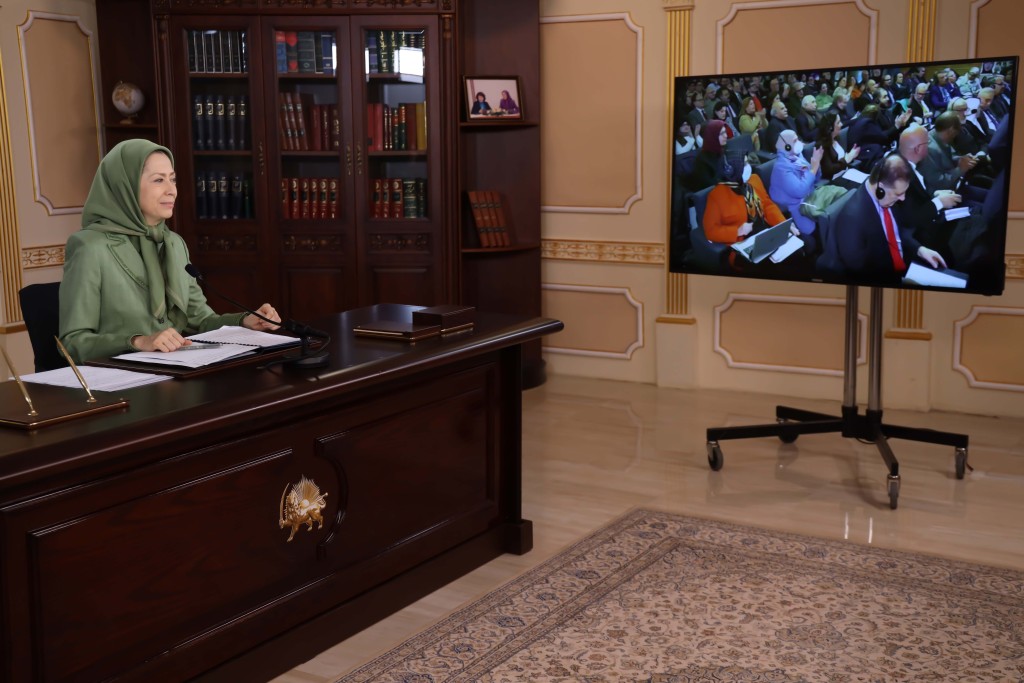
Speech to Arab-Islamic Conference in Brussels: “Solidarity with Iranian people’s democratic revolution”
An Arab-Islamic conference was held in Brussels on Friday, January 27, 2023, in solidarity with the Iranian people’s resistance and uprising, the democratic alternative, the National Council of Resistance of Iran (NCRI), and Maryam Rajavi’s Ten-Point Plan. The conference featured prominent personalities from Jordan, Syria, Tunisia, Algeria, Yemen, Iraq, Sudan, and Mauritania.
Several leaders from the coalition of the Syrian opposition revolutionary forces, including Mr. Nazir Hakim, Mr. Bashar Alhakim (deputy chair of the National Coalition), Mr. Haytham Maleh, Mr. Anwar Malek, former rapporteur of the Arab League, and Mr. Ahmad Kamel attended the conference.
Jordanian dignitaries, Dr. Musa AlMaani, former advising minister at the Office of the Prime Minister; Dr. Asma Al Rawahna, chair of the National Coalition Faction of the Parliament; Mr. Hayel Dawoodieh, former Minister of Endowments, and Dr. Ismaeel Al Mashaqeba, MP, addressed the conference.
Other participants in the Arab-Islamic Conference in Brussels included Mr. Mustafa Allouch, Secretary of the National Council of Lebanon; Mr. Hatem Al Sir Ali, former Minister of Commerce and Transportation from Sudan; Dr. Mohammad Jomeih, Yemen’s Ambassador to UNESCO; Mr. AbdulWahab Mouawadha, MP and chair of the Human Rights Committee in the Parliament of Yemen, Mr. Abdolsalam Hormeh, MP from the Parliament of Mauritania and head of the Sawab Faction, Mr. Ramzi Farj, former MP from Tunisia, Dr. Waleed Al Rawi, a political-military researcher and analyst from Iraq, and Ms. Hanan AbdulLatif, head of the European Branch of Rafidayn Human Rights, Iraq.
Maryam Rajavi told the conference: “The uprising has persisted at the cost of at least 750 lives and the arrest and torture of 30,000 protesters. It is a critical moment not only for the future of Iran but also for the destiny of the entire Middle East. There is no doubt that it will also have an impact on the world.
“During the current uprising, the people of Iran have refuted both the past and present regimes thousands of times by their chants of “down with the oppressor, be it the shah or the mullahs’ supreme leader” and similar slogans. As such, the Iranian people have rejected all forms of dictatorship.”
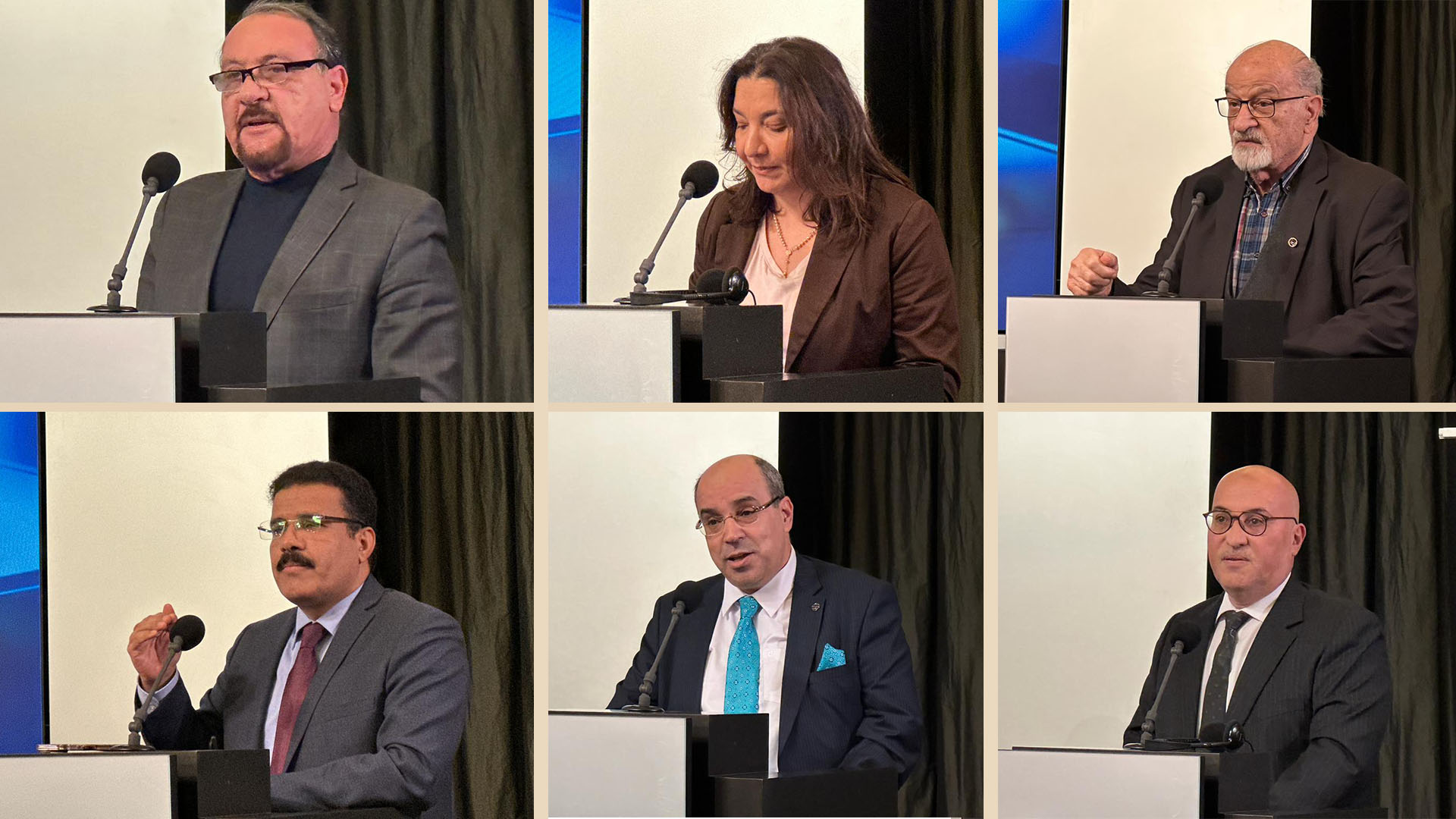
Honorable Members of Parliament,
Dear sisters and brothers,
Thank you for your attention to the Iranian people’s nationwide uprising and the current destiny-making developments. The uprising has persisted at the cost of at least 750 lives and the arrest and torture of 30,000 protesters. It is a critical moment not only for the future of Iran but also for the destiny of the entire Middle East. There is no doubt that it will also have an impact on the world.
The Shah paved the way for Khomeini by the widespread suppression of the opposition. Khomeini was able to hijack the leadership of the Iranian people’s anti-monarchic revolution in 1979 by using these circumstances, including the imprisonment of the cadres of People’s Mojahedin Organization of Iran (PMOI/MEK) and other combatants.
Freedom, peace, and security with the Iranian democratic revolution
From the first days of his rule, Khomeini set out to impose a religious dictatorship on the Iranian people. His medieval and belligerent worldview also inflicted most of the Middle East with insecurity, backwardness, war, and bloodshed that are continuing to this day.
Today, the opposite process is at work. The Iranian people’s democratic revolution against the religious dictatorship, with its 40-year history, will, this time, bring freedom, peace, and security.
The uprising that began on September 16, 2022, quickly spread throughout Iran to 282 cities. The clerical regime had clamped down on universities with multiple espionage and security institutions. But during this period, students rose up and took part in the uprising in 204 universities, about 1,700 high schools and over 100 elementary schools.
These dimensions frightened the regime so much that the IRGC commander-in-chief Hossein Salami compared the regime’s situation to Hiroshima and Nagasaki in the aftermath of the nuclear attacks on those cities.
Despite widespread poverty and hunger unemployment and homelessness of millions of people, Iranian protesters rarely mentioned economic and social hardships in their protests and slogans. The nature, purpose, demands, and direction of the uprising are totally political. It is a massive defeat for the religious dictatorship that the slogan “down with Khamenei” and the calls for the regime’s overthrow have become popular.
Yes, the regime cannot overcome this crisis of survival. The uprising unmasked a deep conflict between Iranian society and the regime. According to the regime’s officials, the number of security agents attacked by protesters reached 7,000.
During this period, the regime used its suppressive forces to the maximum to deal with the uprising, including 32 IRGC regiments from all provinces, the Basij militia, plainclothes agents, the IRGC intelligence, the Ministry of Intelligence, the State Security Force (SSF), and its Special Unit.
Death to the oppressor, be it the shah or the mullahs’ supreme leader
As always, the National Council of Resistance of Iran, the PMOI, and the Resistance Units were the red line and endless nightmare of the regime during the uprising, and they continue to be so. It is not without reason that during the uprising, the number of 17,000 came up again and again by the regime officials and authorities.(1)
The regime has made it completely clear to its interlocutors in the Middle East, Europe, and America that the PMOI and the Iranian Resistance are the red lines. Such clarification is undoubtedly the source of all kinds of censorship and distortion of identity. For the past 40 years, the regime has not found any other opponent on the ground and in practice to overthrow and replace it.
Of course, the religious dictatorship does not appreciate propaganda and polemics against it, but it prefers them a hundred times over a serious alternative. Its message in a thousand languages to its interlocutors in the Middle East, Europe, and the U.S., who have received it very well and are obeying it, is: whatever you do, know that the PMOI is a red line, do not go near it; otherwise it will be severe and intolerable for us. If you have made a mistake and said or done something against the regime, quickly retaliate by criticizing and smearing the Iranian Resistance and the PMOI. At the very least, say that they have no social base! The mullahs’ regime has practiced this method, language, culture, and approach over the past 40 years. Once, Khatami’s foreign minister clearly announced in Italy that “The serious criterion for evaluating the level of honesty of European countries is their relations with the PMOI and this factor is decisive in or future relations.”
The continuation of the uprising, its geographical scope, the diverse composition of participants, and its turning points, have created a situation where, according to Massoud [Rajavi, the Iranian Resistance leader], “it is impossible to return to the previous balance of power as the clock does not turn back. The regime has fallen into the crisis of being overthrown, and no matter which way it turns, it has no way out.”
Politically speaking, the uprising made clear the degree to which the claims and the stage-managed propaganda ploys about the status of the deposed Shah’s family are baseless and alien to the desires of Iranian society.
Over the past two centuries, the Kings in Iran have been subordinates of foreign powers.
The Shah’s father seized power in a British-led coup. The Shah was restored to the throne through a coup d’état organized against Dr. Mohammad Mossadeq.
He was an authoritarian and dependent ruler who never had any support in Iranian society. During the current uprising, the people of Iran have refuted both the past and present regimes by their chants of “down with the oppressor, be it the shah or the mullahs’ supreme leader” and similar slogans. As such, the Iranian people have rejected all forms of dictatorship.
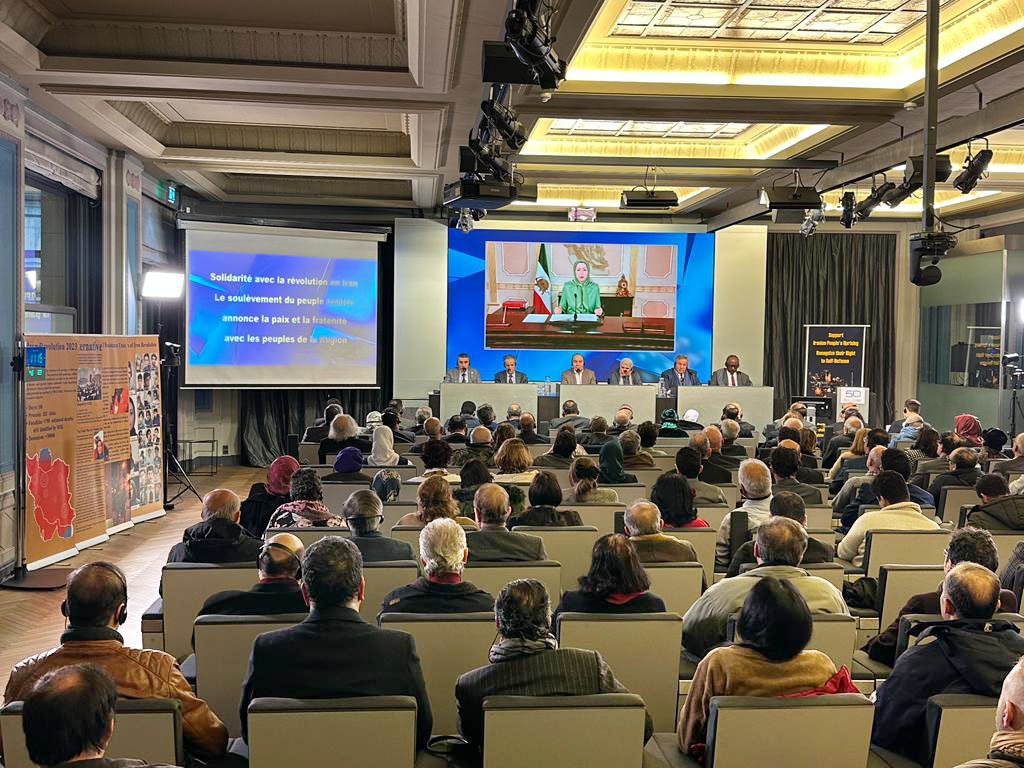
Iranian women at the frontlines of confronting the IRGC
Dear friends,
Women’s pioneering and leadership role in the Iran uprising has impressed the world.
The world was looking at Iran through the prism of the mullahs’ propaganda and Western governments’ policy of accommodating the regime when they suddenly came to realize the degree to which the Iranian society had advanced in its resistance against this medieval regime. Everyone saw that women and girls are on the frontlines of the confrontation with the IRGC and were organizing the protests.
They called and are still calling for the regime’s overthrow in its entirety. They have rebelled against the religious constraints and the compulsory veil; nevertheless, they emphasize that the distinction is not between the veiled and the non-veiled but between the people and the religious tyranny and that all efforts must be focused on overthrowing the regime.
The slogans of Iranian men and women against the entire regime illustrate what we have been saying for years: no to compulsory government, no to compulsory religion, and no to the compulsory veil.
The ruling mullahs see their fundamental interests in creating artificial divisions.
In a country where religious fascism imposes repression and misogyny, oppresses and deprives ethnic groups, and kills tens of millions of people through poverty and starvation, the central conflict is with this reactionary regime. The oppressed people’s main demarcation is with this brutal autocracy.
The mullahs argue over diversionary issues to hide the suppression of freedoms and usurpation of people’s sovereignty. The most crucial division created by the mullahs is between believers and non-believers. Fortunately, the People’s Mojahedin, based on their belief in democratic Islam, have played a decisive role in removing this false distinction.
The current uprising shows that the regime’s ideological pillar, i.e., religious demagoguery, has been dealt a crushing blow. Yes, the mullahs’ regime has not yet fallen. But religious tyranny has failed as a model of governance.
The People’s Mojahedin, advocates of democratic Islam
Dear friends,
The People’s Mojahedin has espoused democratic Islam in the course of its struggle against two dictatorships. This struggle has given the PMOI the ability and competence to sweep aside the veils of deception, ignorance, and distortion and to prevent imposters like the ruling mullahs from abusing Islam to justify their inhuman tyranny.
Since their foundation, especially vis-à-vis Khomeini, the PMOI have openly declared that the Islam they cherish liberates human beings from the chains of tyranny and oppression.
It liberates humans from enslaving beliefs and thoughts. It liberates the energy and creative force of human beings to fully develop their personality.
Islam has come to liberate social relationships from oppression and coercion, so no gender, race, ethnicity, follower of other religions or creeds, or any group of people lose their rights, and no individual is ignored. No one should be considered marginal or insignificant.
There is no compulsion in religion.
لا إِکْراهَ فِی الدِّینِ
Being a believer or not if based on compulsion and reluctance is contrary to Islam.
Imposing inequality on women, ignoring their freedom, and denying their equal rights is against Islam. Establishing a government that, according to Khomeini’s instructions, could ignore the votes of one hundred million people is against Islam.
After the appointment of Malek Ashtar as Governor of Egypt, Ali bin Abi Talib (the first Shiite Imam) wrote to him: “People are of two categories, either they are brothers in religion for you or your fellow human beings.” And he stressed that “the ruling government must have the consent and approval of the people.”
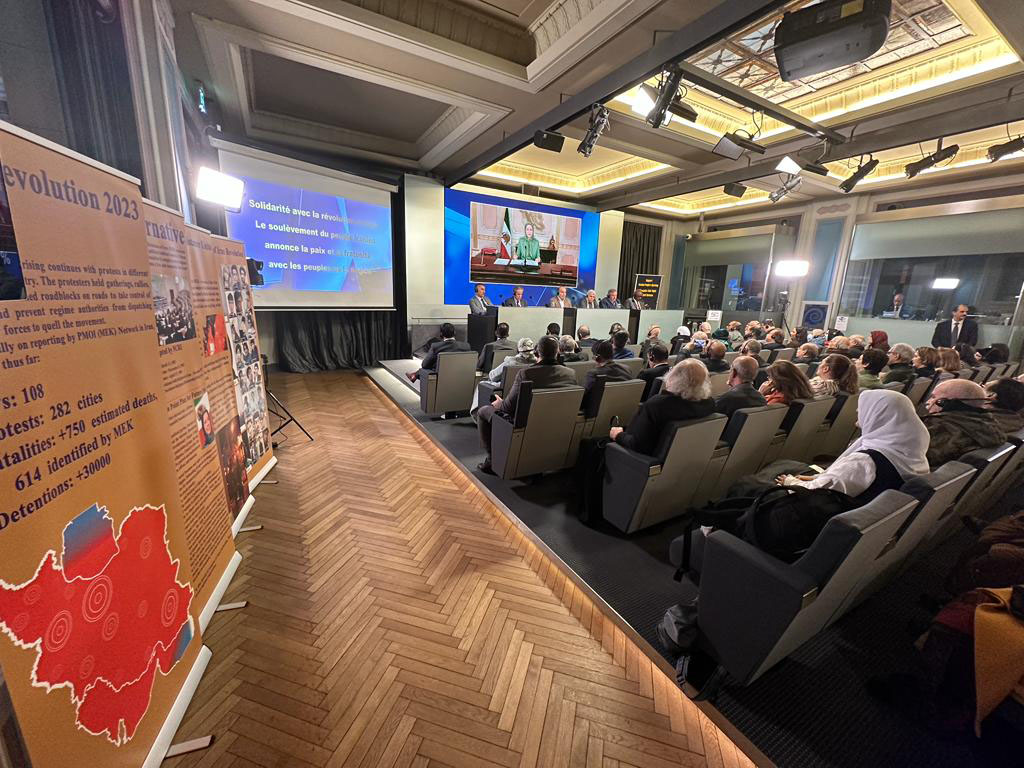
The mullahs’ regime exports fundamentalism and terrorism to the Middle East
For years, the Iranian Resistance has emphasized the need for the expulsion of the mullahs’ regime from Arab countries.
From the outset, the mullahs’ rule and their survival have been based on two pillars: suppression of freedoms and repression inside Iran, and terrorism, murder, and belligerence in the Middle East and the world.
The mullahs have demagogically waged their dirty war abroad and domestic repression, murder, and misogyny in the name of Islam and under the guise of defending Islam.
By killing the People’s Mojahedin members and supporters and other combatants, suppressing the Kurds, Turkmens, and Baluchis, and through a bloody war with Iraq killing millions of people on the Iranian side alone, Khomeini imposed his absolute rule.
Khomeini expanded the IRGC and created extraterritorial branches. Working through proxy groups, the criminal Quds force sowed division, terror, and crimes in Lebanon, Palestine, Yemen, Iraq, and Syria.
And in this way, Khomeini initiated most of the crimes and atrocities that fundamentalist groups committed by imitating the mullahs’ model of government.
In step with the massacre of our Sunni Baluch compatriots in Zahedan, Khamenei also murdered our Sunni brothers in other countries of the region.
Just as he has hanged thousands of Shiite men and women in his prisons, he assassinated and slaughtered Shiites in Iraq and other countries.
To preserve his medieval regime, Khomeini resorted to exporting fundamentalism and terrorism to dominate the region. The outcome of this evil strategy over the past four decades is the repeated eruption of wars in the Middle East, including between Iran and Iraq, the destruction of Syria and the displacement of millions of its innocent people, and considerable blows to the political, economic, and social life of Lebanon, Iraq, and Yemen.
The products of Khomeini’s fundamentalism are the groups that spread terrorism and death, such as Hezbollah in Lebanon and Hashd al-Shaabi in Iraq. But they have nothing to do with Iran or the Iranian people or Islam. On the contrary, they are opposed to Iran and Islam.
One can see here the diametric opposition between the two Islams:
One represents bloodshed and destruction, backwardness, and misogyny; the other is the harbinger of freedom and human emancipation, the standard bearer of equality between women and men, and the advocate of people’s sovereignty.
Since day one, Massoud Rajavi’s only sin was rejecting Khomeini’s religious dictatorship or Velayat-e Faqih and denouncing it as contrary to Islam and its liberating teachings.
Massoud spoke of the conflict with the reactionary Islam of Khomeini and Khamenei; one Islam is “the messenger of darkness and the other is the standard-bearer of freedom, unity, and liberation. But the battle between these two, which at the same time decides the fate of the people and history of Iran is one of the most important links in the destiny of contemporary humanity.”
Call for a common front against the mullahs’ regime
Obviously, Khamenei and his cronies have never been as weak and powerless as they are today. However, despite all the blows it has received from the uprising, the regime will never abandon its repression, terrorism, nuclear program, meddling, and crimes in Syria, Iraq, Yemen, and Lebanon, and the main instrument of all these policies, the IRGC.
These policies are the various components of the regime, and it will not abandon them until it falls.
From this standpoint, the Iranian people’s struggle to overthrow the clerical regime embraces the highest interests of the countries in the region and many parts of the world.
We have been calling on Middle Eastern countries for many years to establish a common front against the Velayat-e Faqih regime. The Iranian people and their resistance are a necessary and decisive component of such a front that is a prerequisite to the swift liberation of Iran and the region from the mullahs’ scourge of religious extremism, terrorism, and warmongering.
Therefore, the Iranian people will not achieve freedom and democracy until the mullahs’ regime is overthrown. Similarly, the region and the world will not achieve peace and tranquility until they stand up to the epicenter of belligerence and terrorism, i.e., the mullahs’ regime.
The alternative, namely the National Council of Resistance of Iran (NCRI), is fighting for a free Iran that brings friendship, fraternity, and peace to the Middle East and the world.
The Iranian people and Resistance are determined to achieve this bright future; it is up to the free men and women of the Middle East to stand with the protesters and contribute to the realization of the great day of freedom for Iran and brotherhood and liberation for the region.
Accordingly, on behalf of the Iranian Resistance and through you, I call on the countries of the region to take these steps:
1. Declare the IRGC as a terrorist entity and stop all political, military, intelligence, and economic relations.
2. Condemn the killing, torture, and repression of protesters in Iran.
3. Expel the mullahs’ regime from the Islamic Cooperation Conference. Arab and Muslim countries should sever their relations with the regime.
4. Recognize the Iranian people’s struggle to overthrow the regime.
5. Endorse the legitimate right of young Iranian protesters to struggle against the mullahs and defend themselves.
Thank you for your support.
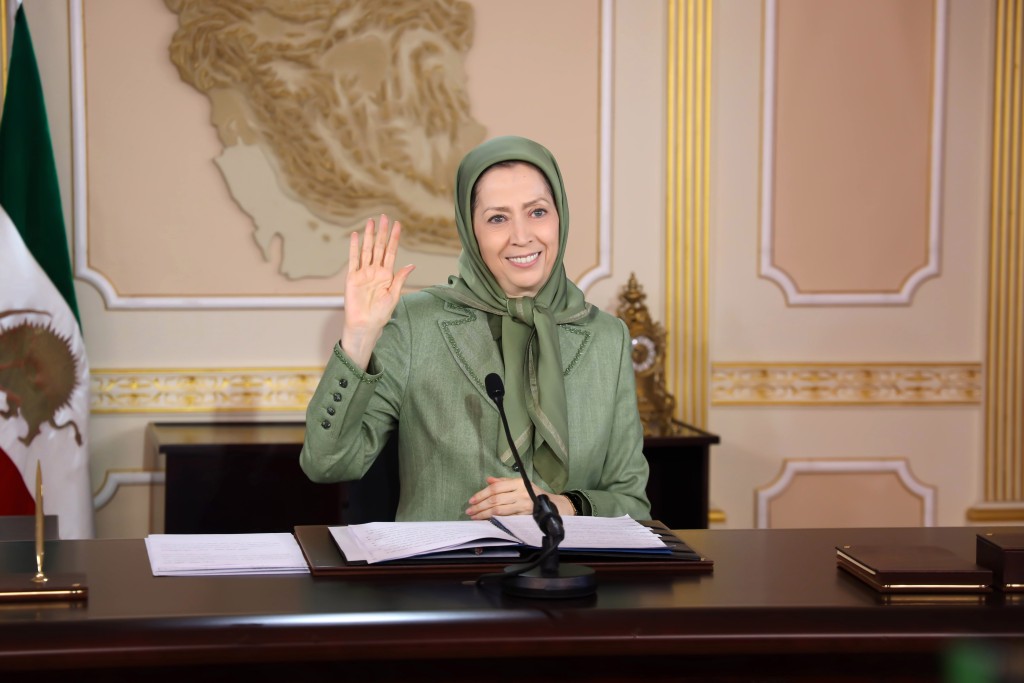
- Tags: fundamentalism, Middle East, mullahs' regime

